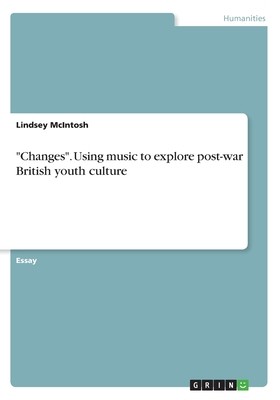
- We will send in 10–14 business days.
- Author: Lindsey McIntosh
- Publisher: GRIN Verlag
- Year: 2017
- Pages: 20
- ISBN-10: 3668432996
- ISBN-13: 9783668432994
- Format: 17.8 x 25.4 x 0.1 cm, minkšti viršeliai
- Language: English
- SAVE -10% with code: EXTRA
Changes. Using music to explore post-war British youth culture (e-book) (used book) | bookbook.eu
Reviews
Description
Essay from the year 2014 in the subject Cultural Studies - Miscellaneous, grade: 75 (A), University of Strathclyde, language: English, abstract: When the American director John Hughes chose to open the credits of his 1985 film "The Breakfast Club" with following lyrics taken from David Bowie's 1971 single "Changes", his intention in doing so was to challenge the commonplace notions of youth plaguing 1980s teen-culture in America. "And these children that you spit on as they try to change their worlds, Are immune to your consultations - they're quite aware of what they're going through..." The film's troubled 'teenage' protagonists, exaggerated caricatures of rebellious youth who spend an entire Saturday detention within a school library in atonement for their individual delinquencies, begin their journey defined 'in the simplest terms and the most convenient definitions' lavished upon them by their adult authorities. Bowie's lyrics were applied to "The Breakfast Club" by Hughes in order to glamorize the notion of 'us versus them' and youth isolation within the cultural landscape of 1980s America. However, these lyrics can also be aptly applied to the much-discussed issue of 'youth culture' within the British post-war landscape. Although 'Changes' was not released until the early 1970s, its lyrics effectively capture the tone of the previous two decades in Britain; decades in the throes of social and political change, with a newly formed 'youth' group who were becoming increasingly aware of that fact. Following the arrival of rock n' roll in the late 1950s, British youths underwent a period of self-realisation in the 1960s as music, particularly rock n' roll, drove a wedge between teenagers and the 'parent culture', effectively isolating them into their own unique cultural island. The primary ambition of this essay, therefore, will be to assess the change implemented by music during these post-war decades and whether it is possible to utilize music as a tool for e
EXTRA 10 % discount with code: EXTRA
The promotion ends in 21d.02:22:16
The discount code is valid when purchasing from 10 €. Discounts do not stack.
- Author: Lindsey McIntosh
- Publisher: GRIN Verlag
- Year: 2017
- Pages: 20
- ISBN-10: 3668432996
- ISBN-13: 9783668432994
- Format: 17.8 x 25.4 x 0.1 cm, minkšti viršeliai
- Language: English English
Essay from the year 2014 in the subject Cultural Studies - Miscellaneous, grade: 75 (A), University of Strathclyde, language: English, abstract: When the American director John Hughes chose to open the credits of his 1985 film "The Breakfast Club" with following lyrics taken from David Bowie's 1971 single "Changes", his intention in doing so was to challenge the commonplace notions of youth plaguing 1980s teen-culture in America. "And these children that you spit on as they try to change their worlds, Are immune to your consultations - they're quite aware of what they're going through..." The film's troubled 'teenage' protagonists, exaggerated caricatures of rebellious youth who spend an entire Saturday detention within a school library in atonement for their individual delinquencies, begin their journey defined 'in the simplest terms and the most convenient definitions' lavished upon them by their adult authorities. Bowie's lyrics were applied to "The Breakfast Club" by Hughes in order to glamorize the notion of 'us versus them' and youth isolation within the cultural landscape of 1980s America. However, these lyrics can also be aptly applied to the much-discussed issue of 'youth culture' within the British post-war landscape. Although 'Changes' was not released until the early 1970s, its lyrics effectively capture the tone of the previous two decades in Britain; decades in the throes of social and political change, with a newly formed 'youth' group who were becoming increasingly aware of that fact. Following the arrival of rock n' roll in the late 1950s, British youths underwent a period of self-realisation in the 1960s as music, particularly rock n' roll, drove a wedge between teenagers and the 'parent culture', effectively isolating them into their own unique cultural island. The primary ambition of this essay, therefore, will be to assess the change implemented by music during these post-war decades and whether it is possible to utilize music as a tool for e


Reviews